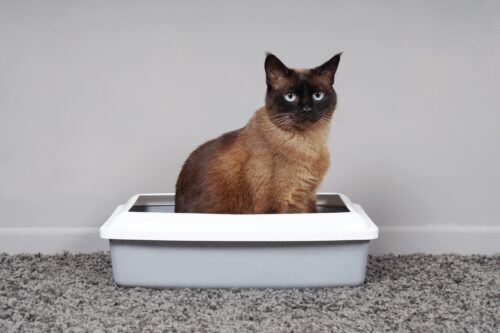10 Potential Causes of Your Cat’s Diarrhea
As a dedicated team at North Kenny Veterinary Hospital in Columbus, Ohio, we understand your concerns when your cat experiences health issues like diarrhea. Diarrhea in cats can be alarming, and understanding its potential causes is the first step to ensuring your beloved pet receives the care they need. In this article, we’ll explore ten common causes of diarrhea in cats. Remember, if you’re worried about your cat’s health, don’t hesitate to call us at (614) 451-1204 for advice or to schedule an appointment.

Dietary Indiscretions: When Cats Eat What They Shouldn’t
Common Culprits in the Home
Cats are curious creatures, and sometimes this curiosity leads them to eat things they shouldn’t. Dietary indiscretions can range from ingesting spoiled food, overeating, or consuming non-food items. These sudden changes in diet can upset your cat’s digestive system, resulting in diarrhea. Be vigilant about keeping harmful foods and small objects out of your cat’s reach.
The Impact of Sudden Diet Changes
Switching your cat’s diet abruptly can also lead to digestive upset. Cats have sensitive stomachs, and it’s important to introduce new foods gradually. If you’re considering a diet change, consult with our veterinarians at North Kenny Veterinary Hospital for recommendations tailored to your cat’s needs.
Food Intolerance or Allergies
Cats, like humans, can develop intolerances or allergies to certain food ingredients. Common allergens include beef, dairy products, and fish. Symptoms of food allergies in cats can include diarrhea, vomiting, and skin irritation. If you suspect your cat has a food allergy, contact us for an evaluation and dietary advice.
Parasites Causing Gastrointestinal Distress
Parasites such as worms and protozoa are a common cause of diarrhea in cats. These parasites can be contracted from contaminated soil, water, or from fleas. Regular deworming and flea control are essential in preventing these infestations. If you’re concerned about parasites, let’s discuss the best preventive measures for your cat.
Infections: Bacterial, Viral, and Fungal
Various infections can cause diarrhea in cats. Bacterial infections like Salmonella, viral infections such as feline panleukopenia, and even fungal infections can lead to significant gastrointestinal distress. Keeping up with vaccinations and maintaining a clean environment are key to preventing these infections. If your cat shows signs of illness, prompt veterinary attention is crucial.
Inflammatory Bowel Disease
Inflammatory bowel disease (IBD) in cats is a condition where the lining of the digestive tract becomes chronically inflamed. This can lead to symptoms like diarrhea, weight loss, and vomiting. IBD requires a veterinary diagnosis and often involves dietary management and medication. If you suspect your cat has IBD, reach out to us for a comprehensive evaluation.
Organ Dysfunction
Organ dysfunctions such as liver or kidney disease can manifest with symptoms like diarrhea. These conditions are more common in older cats but can affect felines of any age. Regular health check-ups are important for early detection and management of these conditions. If you notice any changes in your cat’s health, including changes in bowel movements, don’t hesitate to contact us.
Household Hazards Affecting Your Cat
Exposure to toxins, whether from household cleaners, plants, or human medications, can lead to serious health issues, including diarrhea. Always store chemicals and medications safely and be aware of toxic plants. If you suspect your cat has ingested a toxic substance, immediate veterinary care is essential.
Stress: The Emotional Trigger for Physical Symptoms
Stress can have a significant impact on your cat’s digestive health. Changes in the environment, such as moving to a new home or introducing a new pet, can cause stress-related diarrhea. Creating a calm and stable environment for your cat is vital. If your cat seems stressed, we can discuss strategies to help them feel more secure.
Underlying Medical Conditions
Sometimes, diarrhea can be a symptom of an underlying medical condition, such as hyperthyroidism or diabetes. Regular veterinary check-ups are important to catch these conditions early. If your cat has persistent diarrhea, a thorough veterinary examination can help identify and treat any underlying issues.
Your Partner in Feline Health: Understanding Diarrhea
At North Kenny Veterinary Hospital, we are here to help you understand and manage your cat’s health. Diarrhea can be a sign of various conditions, and determining the cause is crucial for effective treatment. Remember, we are just a call away at (614) 451-1204 for advice or to schedule an appointment. Your cat’s health is our priority, and we’re here to provide the care and support you need.
Recent Posts
About North Kenny Veterinary Hospital
North Kenny Veterinary Hospital has been serving Columbus, OH pet families with exceptional veterinary medicine since the 1950s. We put a strong emphasis on preventive medicine as well as low-stress handling to help pets have a more pleasant veterinary experience. We use Fear Free techniques for every cat and dog to help reduce their anxiety and calm their nerves.
